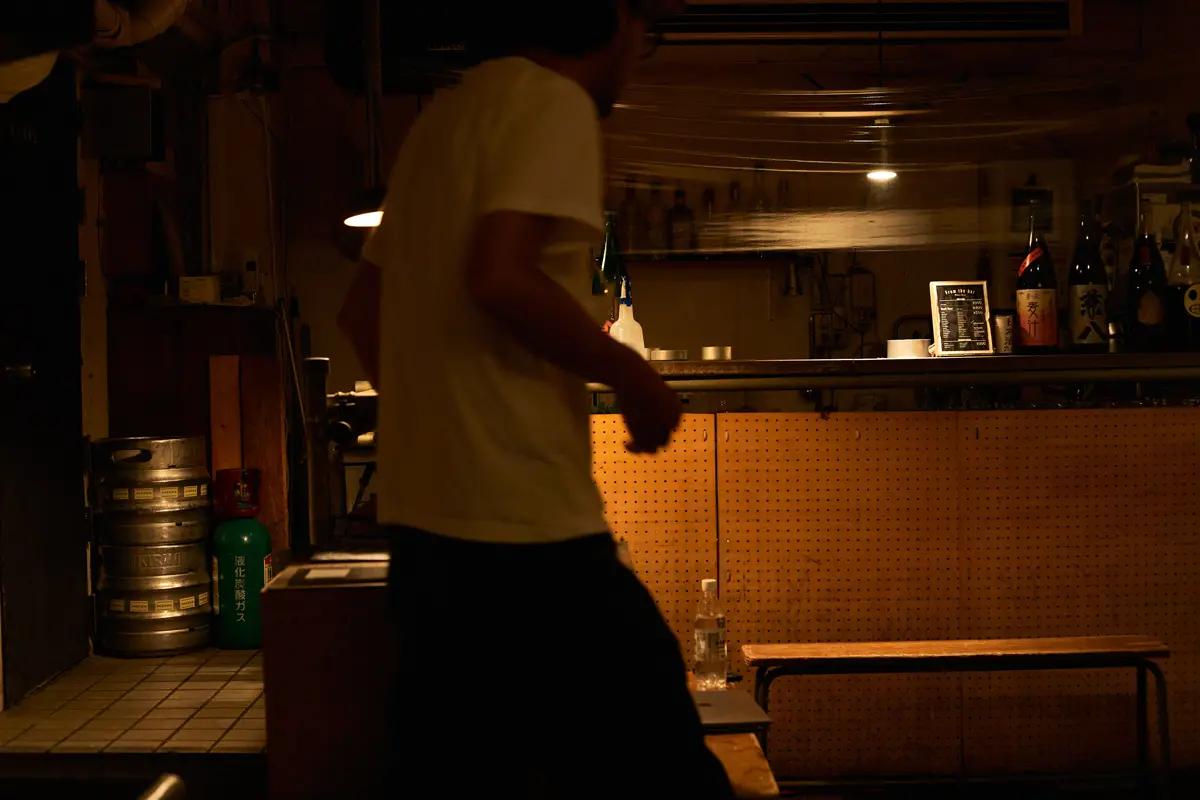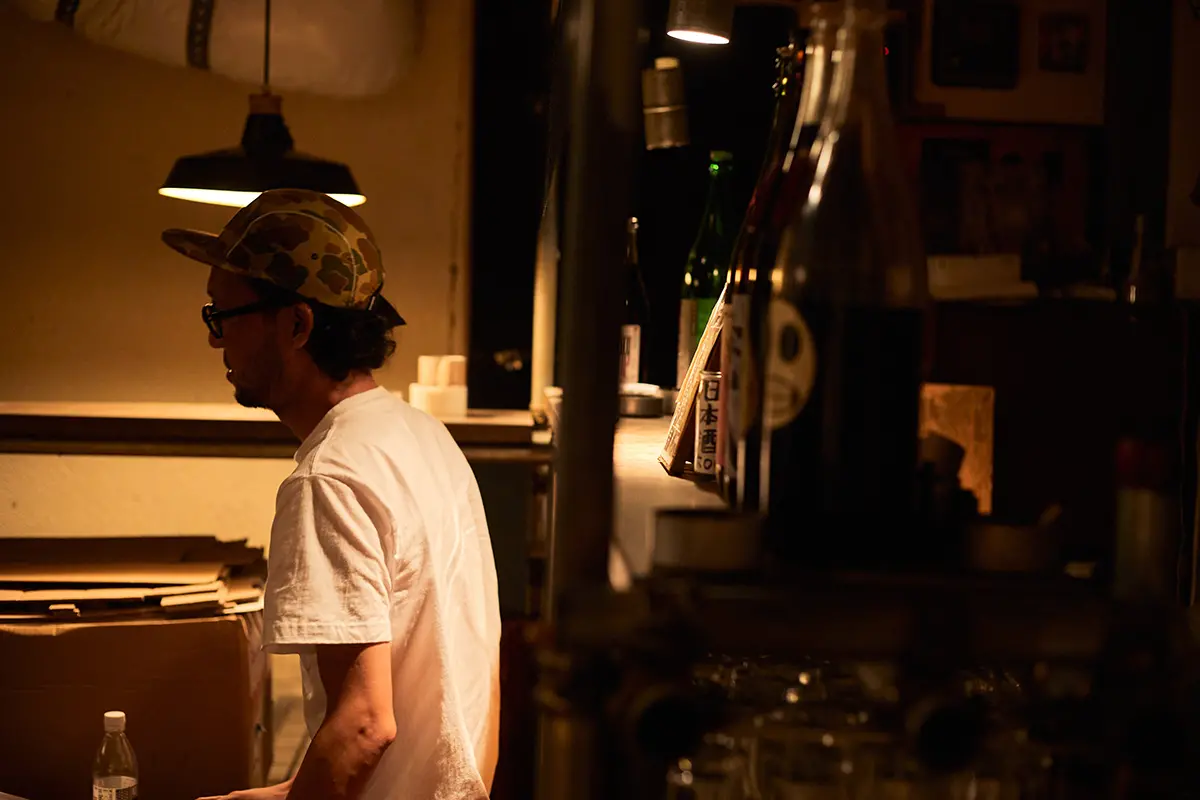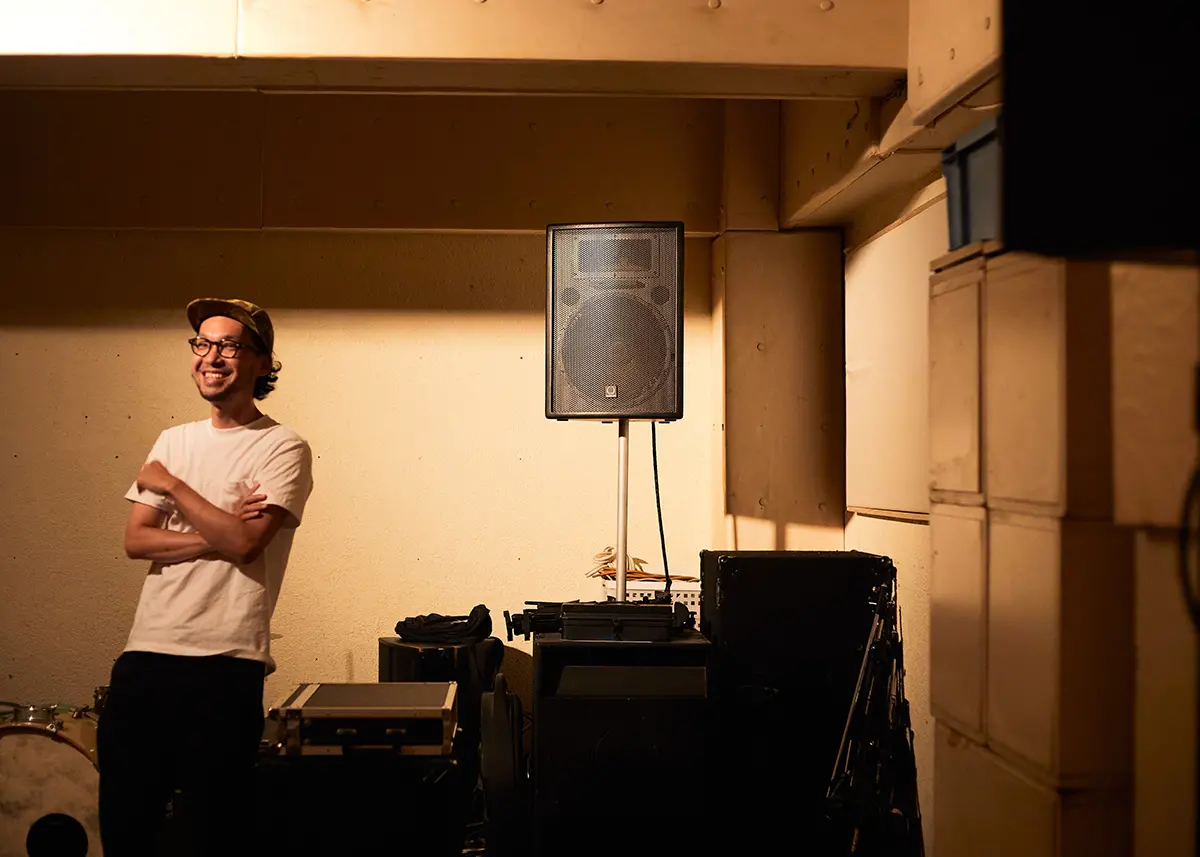
The Beginning
What made you interested in music?
SaharaI grew up in Nerima and there was a skate shop in a neighboring town and its existence was one of the starting points. When I was a freshman or a sophomore in middle school, there were seniors hanging out at the shop and they were the ones who taught me the existence of hip hop. Every once in a while, the shop would hold a skate tournament and people who are around seven to nine years older than me would DJ, which made me interested. At the time, it was the golden age of DJ Premier with Jeru and Group Home and such and that got me interested in scratching and I began to DJ also.
You play keyboards right now but did you have a background in piano in your childhood?
SaharaMy kindergarten was affiliated with a music college so I was playing the violin then but never the piano.
I see. So, you got into hip hop and how about after, like programming and such?
SaharaI started DJing and then when I was about seventeen, I bought a MPC3000 with my parttime job income. I was young, so I was just absorbed with whatever got me excited and fun to me. Getting into clubs for minors was still easier back then, and I would DJ at the parties thrown by those senior crew and DJ along with friends who would MC. After purchasing the MPC, I began to buy old records of genres like jazz, soul and funk which were associated with rare groove for sampling and listened to DJ Shadow, artists from Mo'Wax, Roni Size, drum'n'bass and so forth. By digging the latest music and the old school at the same time, I started to notice things like: "Shadow is digging psychedelic rock," which isn't necessarily connected to quintessential sampling source, which led me to discovering reggae. This happened when I listened to Reflection Eternal out from Rawkus, DJ Hi-Tek was sampling ‘Tom Drunk' by U-ROY. After that, I started to dig reggae as well which I got hooked to. I was about eighteen then.
That's when reggae comes in.
SaharaAt the time, there was a reggaeish compilation called "100% Dynamite" out from Soul Jazz which fitted rare groove enthusiasts' taste so to speak and when I listened to it, I felt this common denominator with hip hop from the strongness of drums and the texture and I was very much attracted. I bought albums from the recorded tracks from the compilation and by doing so, I discovered Augustus Pablo. When I found out that he played the melodica, I thought: "perhaps I could do it too." That's when I started to learn to play the keyboards.
So, Pablo was the turning point. And you begin to create reggae music soon after.
SaharaAnother big turning point for me was to see Kazufumi Kodama san (ex. Mute Beat) play live at the 200th issue anniversary event of RIDDIM magazine. I saw his minimal solo live and the first band performance of Dub Station Band, who is still going strong. Seeing their gig and Pablo's existence took huge parts. Most of the members of the Dub Station Band were members of the Yaho! Band so I began to show up at their gigs soon after. I would go to the venue and talk to Yosuke Kouchi san (Dub Station Band etc.) the bass player and Testu Kitamura san (ex. Dub Station Band etc.) the keyboardist and I would hand them the music I made (laughs.)
You were fanboying.
SaharaOne thing led to another and Tetsu san asked me to be part of the band Dubwiser which he was the leader of. I was about twenty then. If I could call it that, this was my first band experience.
Seems like the 200th issue of RIDDIM was out in 1999 so it all happened around the millennium.
SaharaThat's about right. When we would play live, I would have the opportunities to see other authentic reggae, dub and rock steady bands who would play against us. Even though I was part of a reggae band, I still liked listening to electronic music and by then, I was into genres like electronica such as Ryoji Ikeda and Basic Channel, also J Dilla which led me to Detroit techno and so forth. At the time, there was a separation between electronic music and reggae inside me. That's around when Takeshi "Heavy" Akimoto san (Dry & Heavy etc.) started Rebel Familia (Goth Trad + Heavy) after leaving Dry and Heavy. I went to see them play at the LOFT and the sense of value of authentic reggae broke inside me. At the same time, the wall I had between reggae and electronic music tore down as well. Everything came together as one. Then I started to wonder who this Takeshi Akimoto guy was. My friends and I were throwing events on a regular basis at Heavy Sick Zero at the time, and we would talk about how next level Rebel Familia was. Then when they had a gig at Heavy Sick Zero, I went up to Akimoto san and talked to him, telling him that I was a keyboardist of Dubwiser. That didn't lead to anything that day but a few days later, Kouchi san called me and said: "Akimoto san is looking for a keyboardist from Dubwiser. I think he's talking about you Kazu (Sahara) so I gave him your number."
Then Akimoto san's phone call happens (laugh.)
SaharaHe already had the idea of the Heavymanners and he invited me to come to the studio. That was in 2004.
The actual release of the Heavymanners is in 2008, right?
SaharaRight. I joined around 2004 and started to attend the practice. From then on, there was a rehearsal twice a week. That went on for about the first three years, without showing anyone what we've come up with. Of course, there were no recordings or gigs scheduled either, it was just practice after practice. Two days out of the week, when we're in the studio, we would show Akimoto san what we've come up with, kind of like a presentation or a challenge towards him. So, the rest of the week, I would solely concentrate on what I could show him at the studio. I even moved to Koenji, where the studio was because I felt like I couldn't waste my time on an everyday life. At the time, the Black Smoker's office was in the area as well, so I would hang there and those moments and experiences are really precious to me looking back, kind of like a condensed youth in a way.
I've heard the rumor but indeed his style is disciplined. By the way when did you decide to leave?
SaharaI already had a determination about it around the release party in 2008 but it happened about a year after that. By being part of the band gave me numerous unbelievable opportunities: taking the release party for instance, which took place at Liquid Room and performing at big name festivals. Looking back though, ever since the hangouts with the seniors at the skate shop, joining Dubwiser and then meeting Akimoto san, I was always looked after by people who were older and perhaps, I wanted to be on my own. I was turning into my thirties so considering my life, it was time. I wanted to start something from zero, not one.

From Zero
There is still about five years before you form Undefined in mid-2000's.
SaharaActually, there's another important musical experience and encounter, similar to meeting Kodama san, Akimoto san and Pablo's music. Like I talked about it earlier, I was listening to reggae and dub as well as electronic music, and going back a little, when I was a highschooler, I would go to Coconuts Disk in Ekoda almost every day. I was there all the time, like more often than new arrivals of used records (laughs.) I then began talking to the manager (Shotaro) Matsumoto san and right after I graduated from high school, I asked him if I could work there and he said yes. At Coconuts (Disk,) I was able to meet people whom I've never imagined meeting and I discovered various music that I didn't know about. Especially, there was this impactful encounter with one colleague. He was my age and was studying composition at Tokyo University of Arts. His field of interest in music started from classical to modern and then to live electronics and then to dub. We got along well and we would constantly exchange what's hot. He knew things I had no idea about and he was the one who told me about Pole, Alva Noto and Oval and such. Of course he knew so much about contemporary music so he would teach me about Iannis Xenakis's theory and the concept of soundscape. Through him, I found out about max/msp and processing and by using these tools, I recognized I was able to compose with programing language.
His existence led to open up the deeper sense of electronic and experimental music.
SaharaI think so. Once the Heavymanners got into full gear, I had to rehearse, practice and play gigs in and out of Tokyo every week. I knew I enjoyed those kinds of music but I didn't want them to intervene with my way of musical expression then, like I kind of put them in a separate place. So, when I left the Heavymanners, this time, I decided to make music based on programming language, in a sense of starting from zero. I sold all the records and equipment that I've collected throughout the years except for a laptop and decided to teach myself programming. From then on, it was a back and forth of studying and composing. I wanted a deeper knowledge of the field so I even found a position as a web engineer as a day job. Three years in, I began to grasp the methods and those took shape but there wasn't a single track I was satisfied with.
You bumped into a wall again.
SaharaI was past thirty and I began to notice things like a friend who used to DJ with me back in the day quit and got into culinary and older brother-like figure in my neighborhood left behind all his musical equipment to his friends and went on a different path. Being close to those people, I wanted to quit music gracefully also, rather than dawdle away without making an accomplishment. That decision was in 2012. I needed a convincement before I quit so I decided to look back at my musical chronology. By doing so, I realized that there was an immovable feeling towards dub, something invincible about it inside me. Those three years, I was consciously and unconsciously trying to distance myself from dub but by doing so, I was now able to overlook it, seizing the bigger picture of dub. Calling it philosophy may be an exaggeration but realizing to have that kind of sense in me, I decided to give my all to dub before I quit. If that didn't work out, I should give up. That's probably when I was resolved and that resolution led to the current concept of Undefined.

